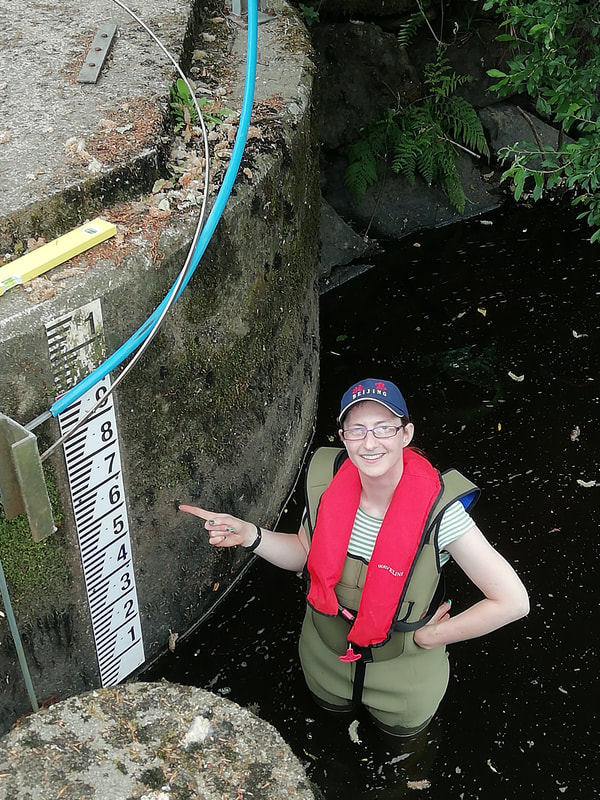Ecohydrology is the study of the ways in which water (both quantity and quality) affect plant, animal and fungal ecology and the ecosystems which they inhabit – and how these in turn affect the water. Fundamentally, it is the linkage of water and life, which is rather important since without water, there is no life.
What are your undergraduate and graduate degrees in?
BSc in Biology (with a year in industry) at the University of York, UK.
PhD in Environmental Science with a thesis entitled “A Burning Issue: Assessing the impact of alternative grouse moor managements on vegetation dynamics and carbon cycling on UK blanket bogs” at the University of York, UK.
How did you arrive at working in/thinking about ecohydrology?
That’s a really interesting question since when I was asked to write this, I initially denied being an ecohydrologist! To be honest, I’m not sure I’d ever really heard of ecohydrology as a discipline! However, once I started thinking about it, I realixed I’ve certainly dabbled in ecohydrology, even if I’m not a fully paid-up member.
During my undergraduate degree, I had the opportunity to do a year in “industry” as part of the degree and ended up with a placement at the Game and Wildlife Conservation Trust in the Highlands of Scotland. Whilst most of what I did involved radio-tracking grouse, I was constantly surrounded by peatlands, many of which were burnt to encourage heather plants to feed grouse for the shooting industry, and I became interested in these ecosystems.
This led me to a PhD looking at the impacts on carbon and vegetation dynamics of burning and other alternative managements on peatlands that were being managed as grouse moors. Given peat can be up to 97% water, inevitably hydrology came into it, and I ended up combining everything in a study looking at how peatland management, vegetation type and water table impact the measurable volume of peat (the surface really does “breathe” in line with water dynamics) and hence the calculated quantities of stored carbon.
I continued with the hydrological theme in a postdoc at Ulster University/the Agri-Food and Biosciences Institute, monitoring the effects of a financial incentive scheme in agricultural areas on the Irish border on water quality. In the Source to Tap project (www.sourcetotap.eu), we specifically targeted pesticide, color and turbidity reduction in the river water, which is abstracted for drinking. I’m currently working on the rather different topic of abating ammonia emissions from agriculture but, given how wet it usually is on the island of Ireland, I’m sure some ecohydrology will creep into it soon enough.
What do you see as an important emerging area of ecohydrology?
Given my rather peat-y background, I think a really important area of ecohydrology that needs exploring is what will happen to peatlands across the world under different weather patterns. Certainly Sphagnum-based peatlands (which encompasses most northern hemisphere peatlands – although there are others in the tropics) tend to exist in a relatively cool and damp climate envelope. Theoretically, they can shift location as the climate changes – but human activities have already stressed many peatlands and urban and industrial developments potentially mean there is nowhere for some to go.
Do you have a favorite ecohydrology paper? Describe/explain.
It’s not a paper but actually a report. Peatbogs and Carbon: A critical synthesis by Richard Lindsay (2010) (https://repository.uel.ac.uk/item/862y6)[MP1] details pretty much anything you need to know about peatbogs, from the basics of their hydrological functioning, though typical vegetation assemblages, carbon storage and carbon accumulation to the effects of a multitude of different (largely anthropogenic) pressures on peatlands. This is a document I’ve returned to time and time again, to the point where it became known by a few of us during my PhD as “The Bog Bible”!
What do you do for fun (apart from ecohydrology)?
I enjoy being outside and regularly go walking and exploring different corners of Northern Ireland and, when travel restrictions allow, the Republic of Ireland. I also scuba dive, mainly in the UK (yes, it may be cold and dark, but is more beautiful than and probably as diverse as many warmer locations), and occasionally go open-water swimming in the sea. More recently, I have got into yoga and (pre-Covid) pottery.
[MP1]This is probably a bit weird to put in a repository link but it is the most stable link I can find to it and the webpage contains two different links to pdfs of the report that work, which is better than it used to be!

 RSS Feed
RSS Feed